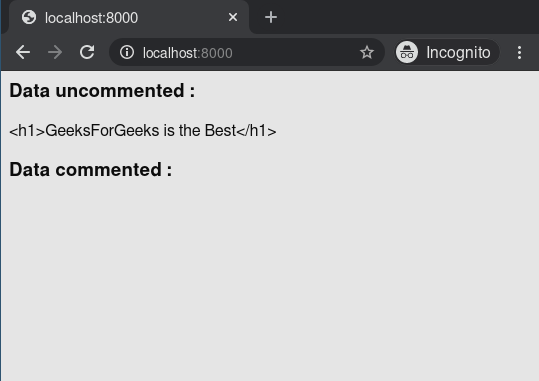comment - теги шаблона Django
A Django template is a text document or a Python string marked-up using the Django template language. Django being a powerful Batteries included framework provides convenience to rendering data in a template. Django templates not only allow paassing data from view to template, but also provides some limited features of a programming such as variables, for loops, comments etc.
This article revolves about how to use comment tag in Template. Template ignores everything between {% comment %} and {% endcomment %}. An optional note may be inserted in the first tag. For example, this is useful when commenting out code for documenting why the code was disabled.
Syntax
{% commment "comment_name" %}
{% endcomment %}
Example
{% comment "Optional note" %}
Commented out text with {{ create_date|date:"c" }}
{% endcomment %}
Comment – Django template Tags Explanation
Illustration of How to use comment tag in Django templates using an Example. Consider a project named geeksforgeeks having an app named geeks.
Refer to the following articles to check how to create a project and an app in Django.
- How to Create a Basic Project using MVT in Django?
- How to Create an App in Django ?
Now create a view through which we will pass the context dictionary,
In geeks/views.py,
# import Http Response from djangofrom django.shortcuts import render # create a functiondef geeks_view(request): # create a dictionary context = { "data" : "<h1>GeeksForGeeks is the Best</h1>", } # return response return render(request, "geeks.html", context) |
Create a url path to map to this view. In geeks/urls.py,
from django.urls import path # importing views from views..pyfrom .views import geeks_view urlpatterns = [ path("", geeks_view),] |
Create a template in templates/geeks.html,
Data uncommented :{{ data }}Data commented :{% comment "Optional note" %} {{ data }}{% endcomment %} |
Let’s check is comments are displayed in the template.
Attention geek! Strengthen your foundations with the Python Programming Foundation Course and learn the basics.
To begin with, your interview preparations Enhance your Data Structures concepts with the Python DS Course. And to begin with your Machine Learning Journey, join the Machine Learning – Basic Level Course